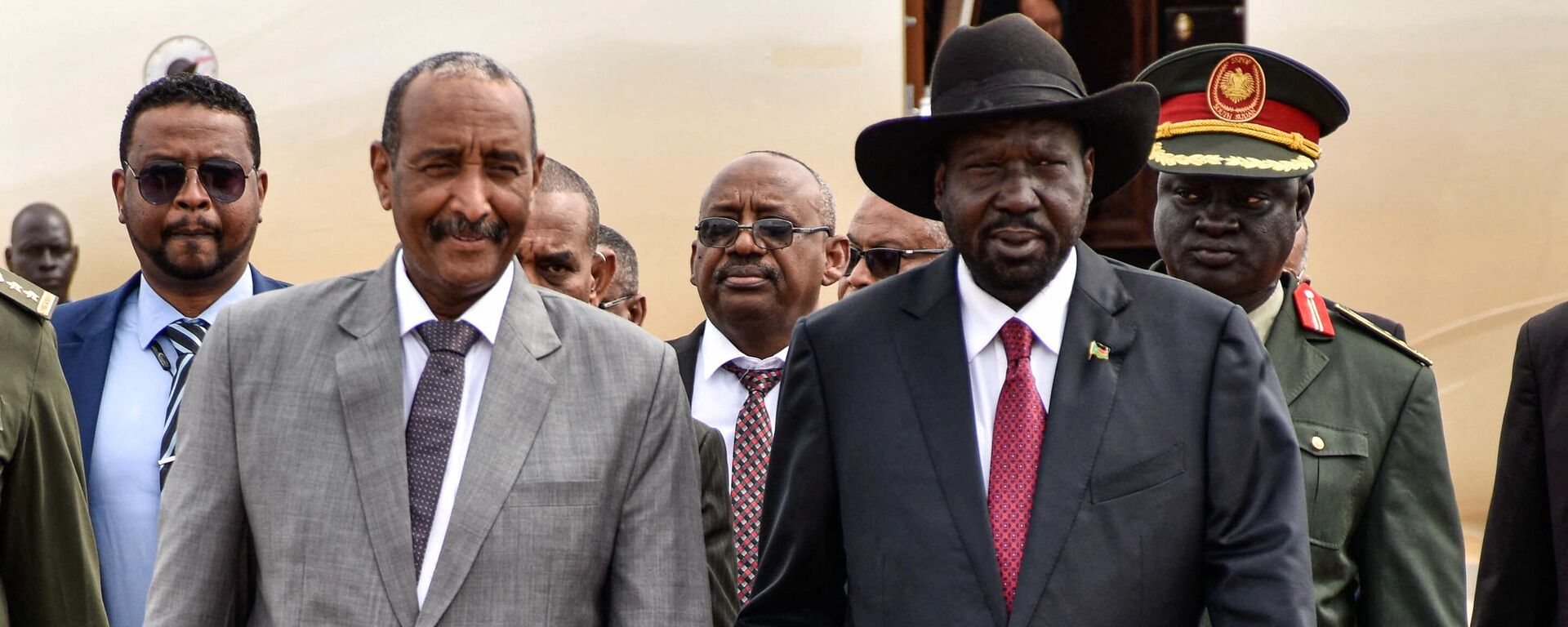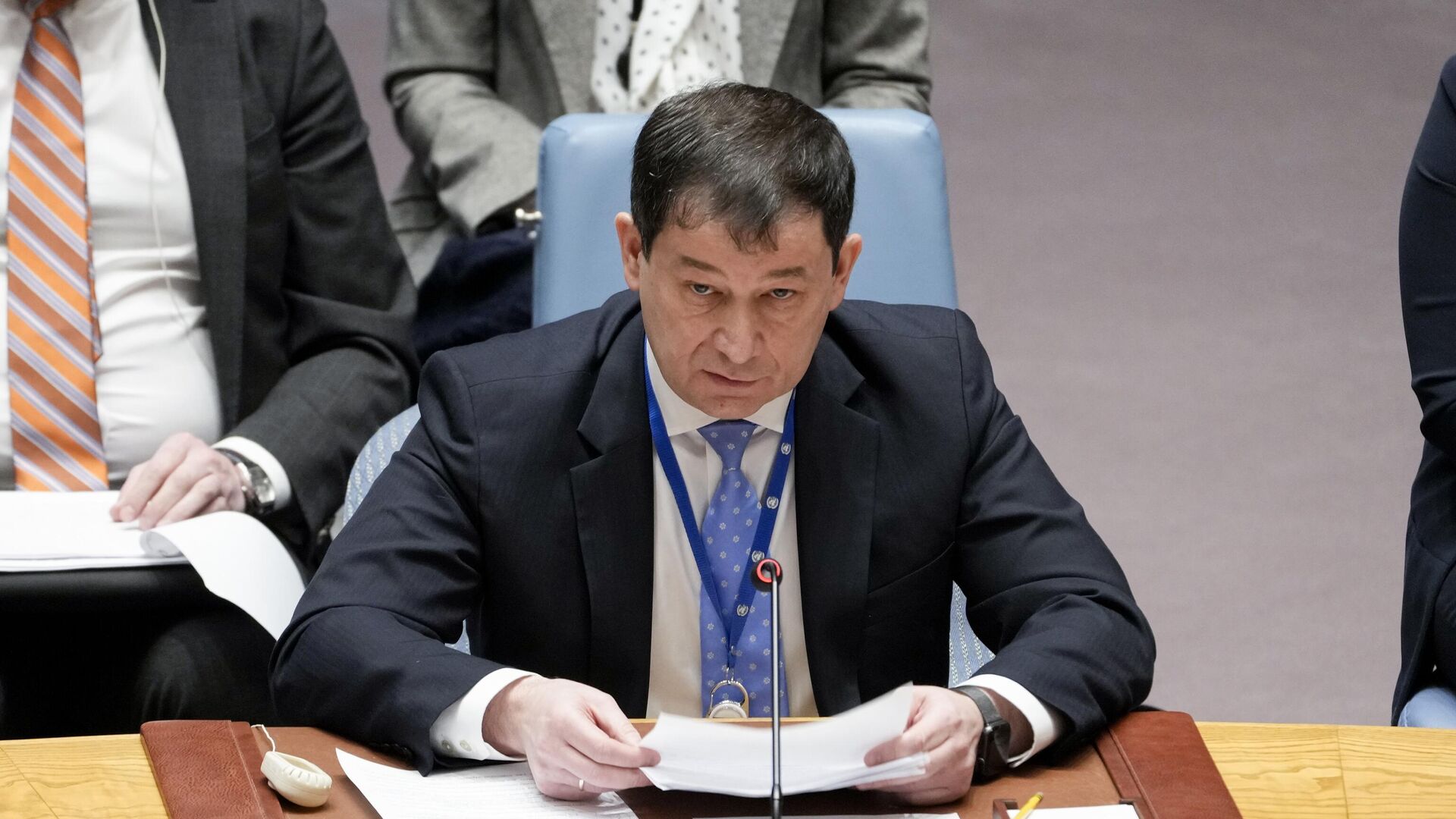https://sputnikglobe.com/20230309/un-security-council-sanctions-against-sudan-no-longer-reflect-situation-russian-envoy-says-1108216136.html
UN Security Council Sanctions Against Sudan No Longer Reflect Situation, Russian Envoy Says
UN Security Council Sanctions Against Sudan No Longer Reflect Situation, Russian Envoy Says
Sputnik International
During the UNSC vote on extending sanctions against Sudan, First Deputy Permanent Representative of Russia to the UN Dmitry Polyanskiy said the Russian Federation is in favor of Council's sanctions being justified and amended.
2023-03-09T14:27+0000
2023-03-09T14:27+0000
2023-03-09T14:27+0000
africa
sudan
north africa
darfur
the united nations (un)
un security council (unsc)
russia
china
sanctions
https://cdn1.img.sputnikglobe.com/img/07e7/03/09/1108216678_0:0:3072:1728_1920x0_80_0_0_13e03dfbf328fb35e26793771ad7980c.jpg
During the United Nations Security Council vote on the issue of extending sanctions against Sudan, First Deputy Permanent Representative of Russia to the UN Dmitry Polyanskiy said the Russian Federation is in favor of Council's sanctions being justified and amended until they are lifted.It is unacceptable to use them as a punitive measure, Polyanskiy stressed.He recalled that the positions of the Arab League and the African Group were also in favor of lifting the sanctions.The Russian diplomat emphasized that despite requests from seven member states to continue negotiations on the issue, the penholder of the case, the US, forced a vote.Along with Polyanskiy, Dai Bing, charge d'affaires of China's permanent mission to the United Nations, also said that the sanctions need to be lifted.He pointed to the signing of the Juba Peace Agreement in 2020 between the Sudanese transitional government and the armed opposition, and the completion by the UN-African Union Mission in Darfur (UNAMID) of its mandate and the mission's withdrawal from Darfur at the end of the same year.The envoy also reiterated China's call for a comprehensive assessment of the existing Security Council sanctions regime and the formulation of clear and feasible exit criteria, as in practice, sanctions turned into a substitute for diplomatic efforts, a means of political pressure for some countries.The 15-member Security Council Wednesday decided, with a vote of 13 in favor and two abstentions (China and Russia), to extend through 12 March 2024, the mandate of the Panel of Experts charged with assisting its Sudan sanctions committee.The UN Security Council’s sanctions against Sudan, including an arms embargo, were imposed in 2005 in order to contribute to the prevention of the conflict in the Darfur region.Before the UN, the US began imposing its sanctions against Sudan in 1997 and has since continuously reviewed them, adding on more restrictions.Despite the fact that in October 2020, a peace deal between the Sudanese government and rebels from the Darfur region was signed and Sudan called for an end to the sanctions, they still remain in place.In October 2021, the Sudanese military led by General Abdel Fattah al-Burhan seized power in Sudan through a military coup, which resulted in US President Joe Biden's decision to extend the American sanctions against the African country.According to al-Burhan, it was necessary to dissolve the Sovereignty Council and the transitional government of Sudan, which were established after the 2019 Sudan military coup, because they were constantly fighting each other and did not contribute to bringing the transitional period to an end.He said July 2023 would see the transition of power from the military to a civilian government after the elections.However, on 5 December 2022, the military and civil opposition signed a political framework agreement that envisaged the establishment of a transitional civil administration in two years.
https://sputnikglobe.com/20230113/sudan-south-sudan-agree-to-create-joint-forces-to-ensure-border-security-1106276139.html
africa
sudan
north africa
darfur
russia
china
Sputnik International
feedback@sputniknews.com
+74956456601
MIA „Rossiya Segodnya“
2023
News
en_EN
Sputnik International
feedback@sputniknews.com
+74956456601
MIA „Rossiya Segodnya“
Sputnik International
feedback@sputniknews.com
+74956456601
MIA „Rossiya Segodnya“
sudan sanctions, un security council sudan, juba peace agreement
sudan sanctions, un security council sudan, juba peace agreement
UN Security Council Sanctions Against Sudan No Longer Reflect Situation, Russian Envoy Says
Sudan has been under sanctions by the UN Security Council, including an arms embargo, since 2005. While the conflict in the Darfur region, which served as the reason for the sanctions, is being resolved as envisaged by the 2020 Juba agreement, the restrictions in 2023 have remained in place without being reviewed.
During the United Nations Security Council vote on the issue of extending sanctions against Sudan, First Deputy Permanent Representative of Russia to the UN Dmitry Polyanskiy said the Russian Federation is in favor of Council's sanctions being justified and amended until they are lifted.
It is unacceptable to use them as a punitive measure, Polyanskiy stressed.
He recalled that the positions of the Arab League and the African Group were also in favor of lifting the sanctions.
The Russian diplomat
emphasized that despite requests from seven member states to continue negotiations on the issue, the penholder of the case, the US, forced a vote.
Along with Polyanskiy, Dai Bing, charge d'affaires of China's permanent mission to the United Nations, also said that the sanctions need to be lifted.
He pointed to the signing of the Juba Peace Agreement in 2020 between the Sudanese transitional government and the armed opposition, and the completion by the UN-African Union Mission in Darfur (UNAMID) of its mandate and the mission's withdrawal from Darfur at the end of the same year.
"Those positive developments pointed to a fundamental shift for the better in the situation in Darfur, and the fact that the Security Council sanctions against Sudan are outdated and should be lifted in light of the improved circumstances on the ground," said Dai Bing.
The envoy also reiterated China's call for a comprehensive assessment of the existing Security Council sanctions regime and the formulation of clear and feasible exit criteria, as in practice, sanctions turned into a substitute for diplomatic efforts, a means of political pressure for some countries.
The 15-member Security Council Wednesday decided, with a vote of 13 in favor and two abstentions (China and Russia), to extend through 12 March 2024, the mandate of the Panel of Experts charged with assisting its Sudan sanctions committee.

13 January 2023, 12:15 GMT
The UN Security Council’s sanctions against Sudan, including an arms embargo, were imposed in 2005 in order to contribute to the prevention of the conflict in the Darfur region.
Before the UN, the US began imposing its sanctions against Sudan in 1997 and has since continuously reviewed them, adding on more restrictions.
Despite the fact that in October 2020, a peace deal between the Sudanese government and rebels from the Darfur region was signed and Sudan called for an end to the sanctions, they still remain in place.
In October 2021, the Sudanese military led by General Abdel Fattah al-Burhan seized power in Sudan through a military coup, which
resulted in US President Joe Biden's decision to extend the American sanctions against the African country.
According to al-Burhan, it was necessary to dissolve the Sovereignty Council and the transitional government of Sudan, which were established after the 2019 Sudan military coup, because they were constantly fighting each other and did not contribute to bringing the transitional period to an end.
He said July 2023 would
see the transition of power from the military to a civilian government after the elections.
However, on 5 December 2022, the military and civil opposition
signed a political framework agreement that envisaged the establishment of a transitional civil administration in two years.



